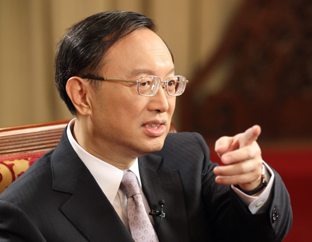China
Sino-US ties not a 'zero-sum game'
By Wu Jiao (China Daily)
Updated: 2010-12-13 07:59
 |
Large Medium Small |
|
|
BEIJING - Foreign Minister Yang Jiechi has urged some United States politicians to rule out the mindset of viewing ties between China and the United States as "a zero-sum game", saying it is "an outdated stereotyped notion".
In an interview on Friday with several major Chinese media including the People's Daily and China Daily, Yang urged the US to respect - and not try to change - the development road taken by the Chinese, and refrain from imposing its will on China.
Yang said Sino-US ties should be cooperative and win-win, instead of a zero-sum game.
"The globalization of the world economy definitely gives rise to more common interests between the two countries, and we should make joint efforts to build mutually-beneficial and win-win partnership in a broad range of sectors," Yang said.
He summarized the ties of the past five years as "developing stably" yet "not always smoothly", noting there are long-term hurdles. He also urged the US to respect Chinese sovereignty and territorial integrity and not interfere into China's internal affairs.
"The two sides should enhance their mutual trust as a precondition to avoid misjudgment," Yang said.
Yang's comments come as President Hu Jintao prepares for his state visit to the US next month, which both sides describe as the most important event in their diplomacy.
Analysts said that given the timing of the interview, Yang is sending signals to the US on the main concerns of China for the upcoming visit.
Da Wei, a scholar with the China Institutes of Contempo-rary International Relations, said Yang's call on respect and understanding by the US on Chinese social systems is mainly due to increasing US pressure on the ideology of China.
US pressure on Google's pull-out of China and the award of the Nobel Peace Prize to a convicted criminal Liu Xiaobo shed light on US' effort to shake China's social system, said Da.
"The US is still afraid of a big China growing with a social system which is different from what it has, so the ideological factor still remains important in its China policy," Da said.
Da said Hu's visit will inject momentum in the near future and ease the urgency of thorny issues such as trade disputes.
However, as some problems will remain for a long time, including ideological differences and territorial issues, the main aim of Hu's visit is to seek consensus and build a "damage control" mechanism to ensure that occasional disputes will not escalate, Da said.
Sino-US ties not only affect bilateral affairs, but also have global impact as the two countries have a common stakes in world security, economics and political affairs.
In October, State Councilor Dai Bingguo and US Secretary of State Hillary Clinton agreed that Hu's visit will be of great significance to the development of bilateral ties, and that Beijing and Washington will maintain close contact to ensure its success.
The US-based think tank Center for Strategic and International Studies said in a recent report that Hu's visit will offer an "opportunity to reset the bilateral relationship".
Jeff Bader, senior director for Asian affairs at the National Security Council, characterizes the Obama administration's approach to China as broadening cooperation with China, while strengthening relationships with partners and allies to rein in China's expanding emergence.
China Daily
